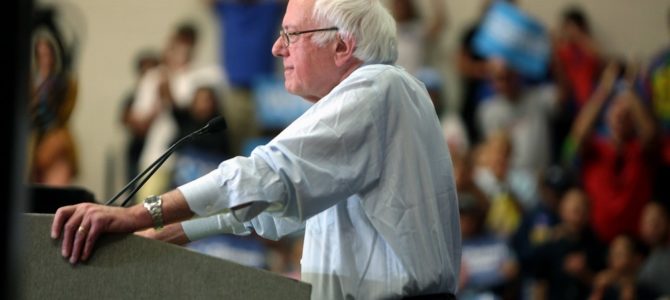Vermont Sen. Bernie Sanders has captured his first win in Super Tuesday 2.0, coming out on top in the North Dakota Democratic caucuses after losing to former Vice President Joe Biden in every other state to vote this week except Washington, where the race remains too close to call.
The winning pot in North Dakota is small, however. It offers only 14 delegates, making it tied with Wyoming for the smallest nominating contest of the primary. With 100 percent of precincts reporting, Sanders will now take a majority of the state’s few delegates after securing more than 53 percent of the vote to Biden’s nearly 40, which is above the 15 percent statewide threshold to score delegates. Sanders also won the state in 2016 with nearly 40 percent of the vote against former Secretary of State Hillary Clinton.
No state in this year’s race for the Democratic nomination is a winner-take-all contest, but to win delegates, candidates must garner 15 percent of the statewide vote to land at-large delegates or 15 percent of the vote in congressional districts to win district delegates.
On Tuesday, Biden swept the rest of this week’s voting states with wide margins, with the races in Mississippi, Missouri, and Michigan called just minutes after polls closed. With 98 percent of precincts reporting in Mississippi, Sanders has won only 14.9 percent of the vote and may not even hit the required 15 percent to take delegates away from Biden. In Missouri, Sanders lost by nearly 26 percent, with 100 percent of precincts reporting — Biden at 60 percent and Sanders at 34 percent. Further west in Idaho, Biden landed a narrower yet decisive 6-point win, taking nearly 49 percent of the vote to Sanders’ 43.
Most consequentially, however, Sanders lost the grand prize of the night in Michigan by almost 20 percent where 125 delegates are in play, making it the biggest state to vote on Tuesday. This week, Sanders failed to repeat the Midwestern momentum he captured in an upset victory four years earlier when he achieved a narrow victory against Clinton despite being down in the polls by 16 percent. As voters went to the polls Tuesday, Sanders remained consistently behind Biden by more than 20 percent in RealClearPolitics’ aggregate of polls, which was reflected in the final vote total.
Sanders’ loss in Michigan spells more trouble than just a steeper hill to climb to reach the 1,991 delegates needed to enter Milwaukee with the nomination. Sanders’ poor performance in the first Midwestern battleground to vote in the contest may make it more difficult to convince voters in subsequent primary states that he is the best to take on President Donald Trump this fall to reclaim critical Rust Belt states that flipped in 2016. By failing to win Michigan, Sanders will have a harder time capturing swing state Ohio, where voters head to the polls next week.









